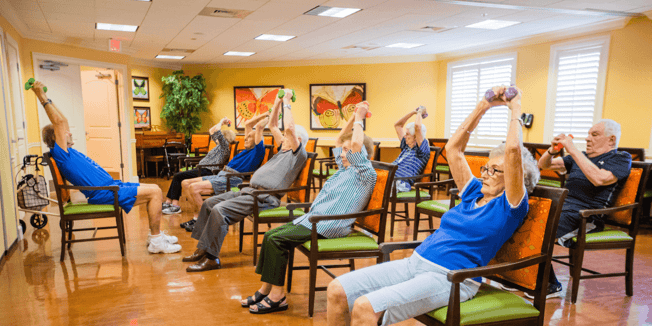Find trained Memory Care staff providing personalized senior care.
Find trained Memory Care staff providing personalized senior care.
Blog Article
The Significance of a Comprehensive Program of Care in Assisted Living Setups
In helped living setups, the implementation of a thorough program of care is vital for addressing the diverse demands of residents. By prioritizing individualized treatment plans and including family members in the process, these programs can considerably boost health outcomes and high quality of life.
Recognizing Comprehensive Care Programs
As assisted living facilities proceed to advance, understanding detailed treatment programs comes to be important for both citizens and their family members. Comprehensive treatment programs are designed to address a variety of demands for people residing in assisted living environments, guaranteeing that each resident gets customized assistance that mirrors their distinct health and wellness conditions and way of life choices.

Furthermore, extensive care programs stress control among various providers, ensuring smooth communication between caretakers, medical personnel, and household participants. This integrated strategy not just enhances the top quality of treatment but additionally promotes a supportive area atmosphere. Families play an integral function in this process, getting involved in care preparation and continuous discussions to make certain that the citizen's needs are consistently satisfied. Recognizing these programs is crucial for making informed choices about treatment options and making best use of the high quality of life for residents in nursing home.
Benefits for Homeowners

(Dementia Care Charlotte)One main advantage of comprehensive care is the renovation in health results. Normal monitoring and collaborated clinical care assistance in the very early discovery and management of chronic conditions, lowering hospital stays and emergency situation treatments. Citizens profit from boosted social engagement, as structured activities and programs promote a feeling of area, combatting feelings of isolation and solitude.
Additionally, residents experience increased assurance, knowing that specialist assistance is conveniently offered must they need support. This assurance allows them to focus on appreciating their day-to-day tasks and preserving significant relationships.
Role of Caretakers
Caretakers play an essential function in the well-being of residents in assisted living facilities, making certain that their demands are satisfied with empathy and competence. They offer as the main point of call for citizens, offering important support in day-to-day activities such as bathing, clothing, and medicine management. Their visibility not only promotes physical wellness however also boosts emotional and social well-being by cultivating connections built on trust fund and understanding.
Along with sustaining daily living jobs, caregivers contribute in keeping an eye on changes in homeowners' health and wellness and behavior. They are educated to recognize refined signs of distress or decrease, enabling prompt interventions that can protect against problems. Their expertise of each citizen's unique background and preferences enables them to deliver individualized treatment, improving the total lifestyle.
In addition, caregivers work as advocates for citizens, communicating their requirements and choices to other health care professionals and member of the family. This advocacy is important in developing a holistic treatment setting that respects the dignity and freedom of each individual. Eventually, the commitment and ability of caregivers are vital parts of an extensive program of treatment, underpinning the success of assisted living setups.
Customizing Treatment Plans
While every citizen in assisted living has one-of-a-kind needs and preferences, personalizing treatment strategies is important to providing reliable and personalized support. A one-size-fits-all technique to care can forget critical aspects of private wellness, possibly bring about suboptimal outcomes. Assisted Living. A thorough assessment of each resident's health status, personal history, and lifestyle choices is paramount in developing tailored treatment approaches.
The customization process entails cooperation amongst medical care specialists, caretakers, and member of the family. By integrating input from all stakeholders, care plans can address not just clinical requirements but also emotional and social variables that add to general high quality of her comment is here life. Regular reviews and updates to these strategies make sure that they stay relevant as residents' problems and preferences evolve over time.
(Memory Care Facilities Charlotte)Furthermore, tailored treatment strategies advertise a feeling of self-respect and freedom amongst citizens, promoting an atmosphere where they really feel valued and appreciated. This individualized technique not just improves the efficiency of care however likewise strengthens the relationship between caregivers and homeowners, developing an encouraging area environment. Eventually, investing in personalized care preparation is a keystone of giving top notch assisted living solutions that satisfy the diverse needs of homeowners.
Enhancing Area Interaction
Building on the foundation of tailored treatment plans, enhancing area involvement is a crucial aspect of improving the total experience for citizens in assisted living (Assisted Living). Energetic engagement in neighborhood activities cultivates social connections, combats sensations of isolation, and adds to psychological wellness. Facilitating possibilities for citizens to participate in team activities, such as art courses, horticulture, and exercise sessions, develops an inclusive setting that advertises interaction and cooperation
Furthermore, incorporating citizens into the more comprehensive community via partnerships with neighborhood organizations can provide enhancing experiences, such as volunteering and participating in cultural occasions. This not only assists residents really feel valued yet also reinforces ties with the bordering neighborhood, improving their sense of belonging.
Moreover, encouraging household participation in neighborhood tasks is important. Memory Care. Family participants can act as important assistance systems, helping to connect the space in between citizens and the neighborhood. Normal family members occasions and open online forums for conversation foster openness and partnership, making certain that the care setting remains receptive to the demands of all stakeholders
Conclusion
In final thought, comprehensive care programs in assisted living setups play a crucial function in enhancing homeowners' well-being. By attending to clinical, emotional, and social needs, these programs not just improve lifestyle but additionally promote early discovery of wellness concerns, reducing the possibility of hospital stays. The participation of family members in treatment preparation reinforces support networks, fostering a dignified and autonomous living environment. Ultimately, such programs contribute significantly to the total wellness end results and satisfaction of homeowners.
Report this page